中考英语情态动词、助动词、系动词专项讲解
中考英语专题复习:动词考点讲解
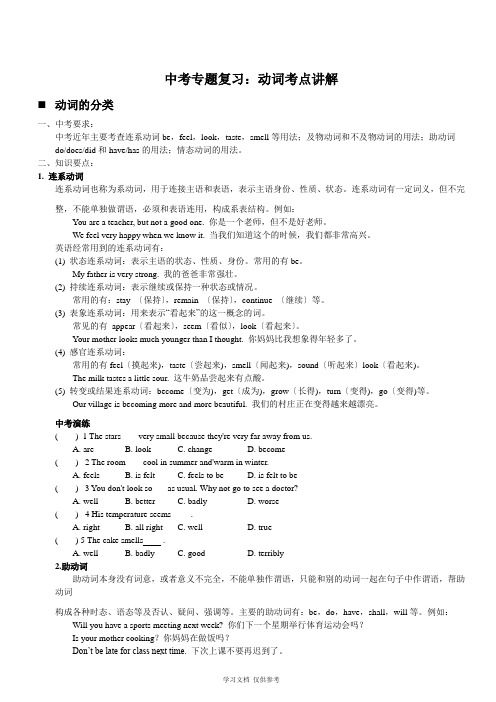
中考专题复习:动词考点讲解动词的分类一、中考要求:中考近年主要考查连系动词be,feel,look,taste,smell等用法;及物动词和不及物动词的用法;助动词do/does/did和have/has的用法;情态动词的用法。
二、知识要点:1. 连系动词连系动词也称为系动词,用于连接主语和表语,表示主语身份、性质、状态。
连系动词有一定词义,但不完整,不能单独做谓语,必须和表语连用,构成系表结构。
例如:You are a teacher, but not a good one. 你是一个老师,但不是好老师。
We feel very happy when we know it. 当我们知道这个的时候,我们都非常高兴。
英语经常用到的连系动词有:(1) 状态连系动词:表示主语的状态、性质、身份。
常用的有be。
My father is very strong. 我的爸爸非常强壮。
(2) 持续连系动词:表示继续或保持一种状态或情况。
常用的有:stay 〔保持〕,remain 〔保持〕,continue 〔继续〕等。
(3) 表象连系动词:用来表示“看起来”的这一概念的词。
常见的有appear〔看起来〕,seem〔看似〕,look〔看起来〕。
Your mother looks much younger than I thought. 你妈妈比我想象得年轻多了。
(4) 感官连系动词:常用的有feel〔摸起来),taste〔尝起来),smell〔闻起来),sound〔听起来〕look〔看起来)。
The milk tastes a little sour. 这牛奶品尝起来有点酸。
(5) 转变或结果连系动词:become〔变为),get〔成为),grow〔长得),turn〔变得),go〔变得)等。
Our village is becoming more and more beautiful. 我们的村庄正在变得越来越漂亮。
中考动词知识点总结

中考动词知识点总结一、动词的分类1.情态动词情态动词是用来表示说话人的情感色彩或者表示说话人对某种行为的看法的动词。
常见的情态动词有can, could, may, might, must, shall, should, will, would等。
情态动词后面跟动词原形,表示主语的能力、许可、可能性、必要性、义务或意向等。
2. 动词的时态动词的时态是表示动作发生的时间的形式。
英语动词的时态有现在时、过去时和将来时,每种时态又可分为简单时、进行时和完成时。
掌握动词的时态对于正确理解英语句子的意思十分重要。
3. 及物动词和不及物动词及物动词是指后面需要接宾语的动词,而不及物动词则是指不需要接宾语的动词。
在中考中,考生需要对及物动词和不及物动词进行正确的使用和区分。
4. 动词的语态动词的语态分为主动语态和被动语态。
主动语态表示主语是动作的执行者,而被动语态则表示主语是动作的承受者。
中考中通常会考查考生对动词语态的正确理解和使用。
5. 不规则动词不规则动词是指在构成其过去分词和过去式时不遵循规则变化的动词。
在中考中,学生需要掌握常见的不规则动词的过去分词和过去式形式,以便正确使用这些动词。
二、动词的用法1. 动词的疑问句在英语的疑问句中,动词需要移至句首才能构成疑问句。
动词在疑问句中的变化和构成方式是中考中的重点考点之一。
2. 动词的否定句在英语的否定句中,需要在动词前加上助动词not来构成否定句。
在中考中,学生需要掌握动词否定句的构成方式,并在实际应用中正确使用。
3. 动词的不定式不定式是动词的一种特殊形式,它可以有自己的主语和宾语,并且可以放在句子的任何位置。
中考会考查学生对不定式的正确使用和理解。
4. 动词的动名词动名词是由动词加上-ing构成的名词形式,它可以充当名词使用。
在中考中,学生需要掌握动名词的构成方式和用法,以便正确使用动名词。
5. 动词的情态动词和助动词情态动词和助动词在句子中的作用是不同的,学生需要掌握情态动词和助动词的用法和区别。
初中英语动词及动词短语考点
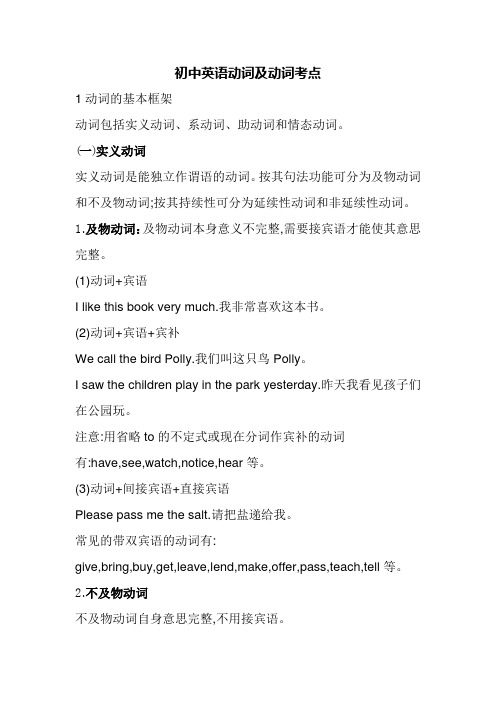
初中英语动词及动词考点1动词的基本框架动词包括实义动词、系动词、助动词和情态动词。
(一)实义动词实义动词是能独立作谓语的动词。
按其句法功能可分为及物动词和不及物动词;按其持续性可分为延续性动词和非延续性动词。
1.及物动词:及物动词本身意义不完整,需要接宾语才能使其意思完整。
(1)动词+宾语I like this book very much.我非常喜欢这本书。
(2)动词+宾语+宾补We call the bird Polly.我们叫这只鸟Polly。
I saw the children play in the park yesterday.昨天我看见孩子们在公园玩。
注意:用省略to的不定式或现在分词作宾补的动词有:have,see,watch,notice,hear等。
(3)动词+间接宾语+直接宾语Please pass me the salt.请把盐递给我。
常见的带双宾语的动词有:give,bring,buy,get,leave,lend,make,offer,pass,teach,tell等。
2.不及物动词不及物动词自身意思完整,不用接宾语。
Horses run fast.马跑得快。
(1)有些动词既可作及物动词又可作不及物动词。
We study English.我们学习英语。
(及物动词)We study hard.我们努力学习。
(不及物动词)(2)有些不及物动词与一些别的词搭配在一起构成动词短语,它的作用相当于一个及物动词。
①动词+介词Listen to the teacher carefully.仔细听老师讲。
此类动词短语后面的宾语无论是名词还是代词,都只能放在介词后面,不能放在动词和介词之间。
②动词+副词+介词Let’s go on with our work!让我们继续我们的工作吧!He gets along well with his classmates.他与他的同学们相处得很好。
中考英语专题系动词、助动词情态动词复习
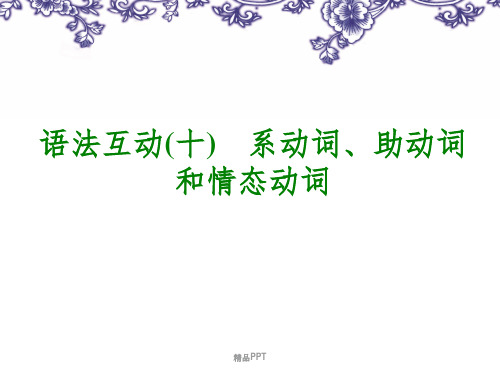
语法互动(十)┃系动词、助动词和情态动词
(2)could也可表示现在,用于婉转地提出请求、建议等,回 答时用can。 —Could you show me the way to the hospital? 你能告诉我去医院的路吗? —Of course I can.当然可以。 (3)can与be able to的区别 can只能用于一般现在时和一般过去时,而be able to可用于 任何时态。 He was able to flee to Europe before the war broke out. 战争 爆发前他成功地逃到了欧洲。
精品PPT
语法互动(十)┃系动词、助动词和情态动词
6.will和would的用法 will用于第二人称的疑问句时,表示征求意见或提建议。 would 为 will 的过去式,可用于多种人称,表示意愿。 Will you have a little soup? 你要不要喝点汤?
精品PPT
语法互动(十)┃系动词、助动词和情态动词
7.归纳:情态动词表推测的用法 (1)肯定句中一般用must(一定),may(可能),might/could(也 许,或许),其中must表推测的语气最强,其余依次减弱。 The book must be hers. Her name is on it. 这本书一定是她的,她的名字在上面。 He must be running.他一定在跑步。 They may know the way to the library. 他们可能知道去图书馆的路。
精品PPT
语法互动(十)┃系动词、助动词和情态动词
2.—He ________ be in the classroom, I think.
—No, he ________ be in the classroom. I saw him go
实义动词、系动词、助动词及情态动词的基本用法

语法课件
实义动词、系动词、 助动词及情态动词的用法
CONTENTS
按照动词的词义和动词在句子中所 起的作用来划分,动词可以分为4 类:实义动词、系动词、助动词和 情态动词。
1. 实义动词 实义动词又叫作行为动词。它可以分 为及物动词和不及物动词,及物动词 后可直接跟宾语,而不及物动词后不 可直接跟宾语。实义动词在句子中能 独立作谓语。
be动词的否定形式: am not(没有缩写形式), are not=aren't, is not=isn't。 be动词的过去式: am, is的过去式是was; are的过去式是were。
rose
be动词必须和主语在人称和数上保持一致。 I用am, you用are; is用于“他、她、它”;复 数全部都用are。
be动词可以和主语一起写成缩写。 I am=I'm, you are=you're, he is=he's, she is=she's, they are=they're
不是所有的主语都可以和be动词缩写,不能缩写的要特殊记忆。 This is不能写成This's; I am not不能缩写成I amn't。 Yes后面的简略回答都不能缩写, Yes, he is.(√) Yes, he's.(×) Yes, we are.(√) Yes,we're.”(×)
John doesn't live in Beijing. 约翰不住在北京。 Did you go to the cinema last Sunday? 上周日你去看电影了吗?
will和shall用于构成一般将来时。shall仅用于第一人称, will可用于各种人称,其否定形式分别为shan't和won't。
系动词助动词情态动词讲义
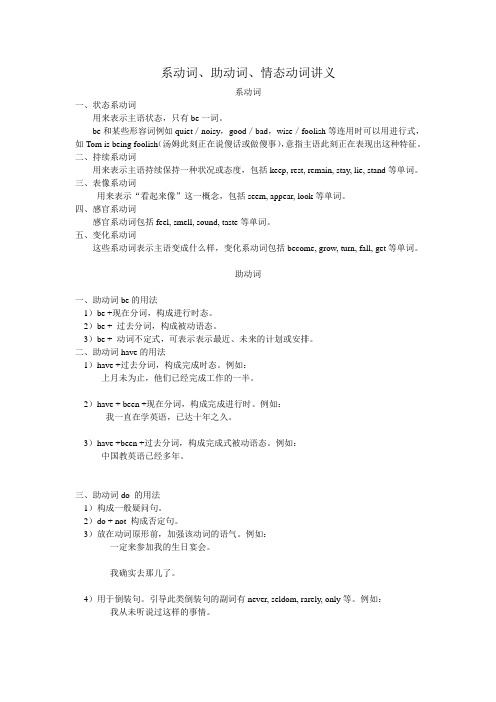
系动词、助动词、情态动词讲义系动词一、状态系动词用来表示主语状态,只有be一词。
be和某些形容词例如quiet/noisy,good/bad,wise/foolish等连用时可以用进行式,如Tom is being foolish(汤姆此刻正在说傻话或做傻事),意指主语此刻正在表现出这种特征。
二、持续系动词用来表示主语持续保持一种状况或态度,包括keep, rest, remain, stay, lie, stand等单词。
三、表像系动词用来表示“看起来像”这一概念,包括seem, appear, look等单词。
四、感官系动词感官系动词包括feel, smell, sound, taste等单词。
五、变化系动词这些系动词表示主语变成什么样,变化系动词包括become, grow, turn, fall, get等单词。
助动词一、助动词be的用法1)be +现在分词,构成进行时态。
2)be + 过去分词,构成被动语态。
3)be + 动词不定式,可表示表示最近、未来的计划或安排。
二、助动词have的用法1)have +过去分词,构成完成时态。
例如:上月未为止,他们已经完成工作的一半。
__________________________________2)have + been +现在分词,构成完成进行时。
例如:我一直在学英语,已达十年之久。
______________________________3)have +been +过去分词,构成完成式被动语态。
例如:中国教英语已经多年。
_____________________三、助动词do 的用法1)构成一般疑问句。
2)do + not 构成否定句。
3)放在动词原形前,加强该动词的语气。
例如:一定来参加我的生日宴会。
______________________我确实去那儿了。
_________________4)用于倒装句。
引导此类倒装句的副词有never, seldom, rarely, only等。
中考英语必考动词的分类及辨析
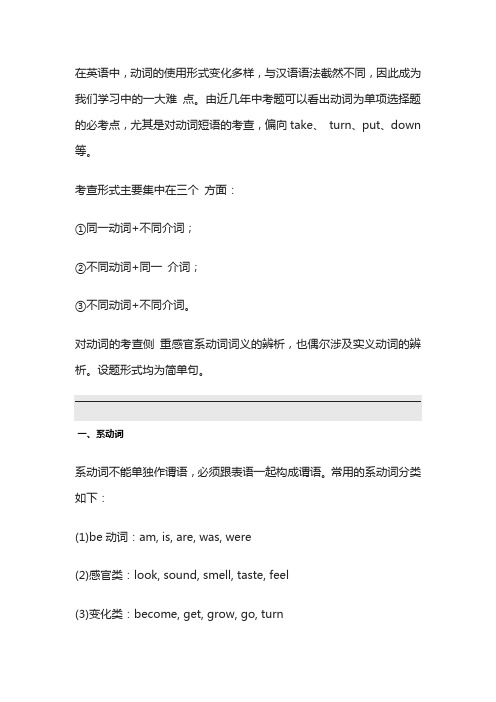
在英语中,动词的使用形式变化多样,与汉语语法截然不同,因此成为我们学习中的一大难点。
由近几年中考题可以看出动词为单项选择题的必考点,尤其是对动词短语的考查,偏向take、turn、put、down 等。
考查形式主要集中在三个方面:①同一动词+不同介词;②不同动词+同一介词;③不同动词+不同介词。
对动词的考查侧重感官系动词词义的辨析,也偶尔涉及实义动词的辨析。
设题形式均为简单句。
一、系动词系动词不能单独作谓语,必须跟表语一起构成谓语。
常用的系动词分类如下:(1)be动词:am, is, are, was, were(2)感官类:look, sound, smell, taste, feel(3)变化类:become, get, grow, go, turn(4)状态类:keep, stay二、助动词助动词本身没有词义,不能单独作谓语,只能和其他动词一起构成谓语,表示时态、语态、语气等特征,共同构成否定、疑问、强调、省略等句子。
主要的助动词有be, have, has, had, do, does, did, will, would 和shall等。
三、实义动词实义动词是能独立作谓语的动词。
按其语法作用分为及物动词和不及物动词;按其持续性可分为延续性动词和非延续性动词。
1.及物动词及物动词本身意义不完整,需要接宾语才能使其意思完整。
(1)动词+宾语如:Can you open the window?(2)动词+宾语+宾补如:We call him Bill.I saw Tom play in the park yesterday.注意:用省略to的不定式或现在分词作宾补的动词有make, let, see, watch, hear, notice等。
(3)动词+间接宾语+直接宾语如:May I ask you a question?Please pass me the book.常见的带双宾语的动词有:give, bring, buy, get, lend, offer, pass, teach, tell, write, return等。
中考英语情态动词、助动词、系动词专项讲解
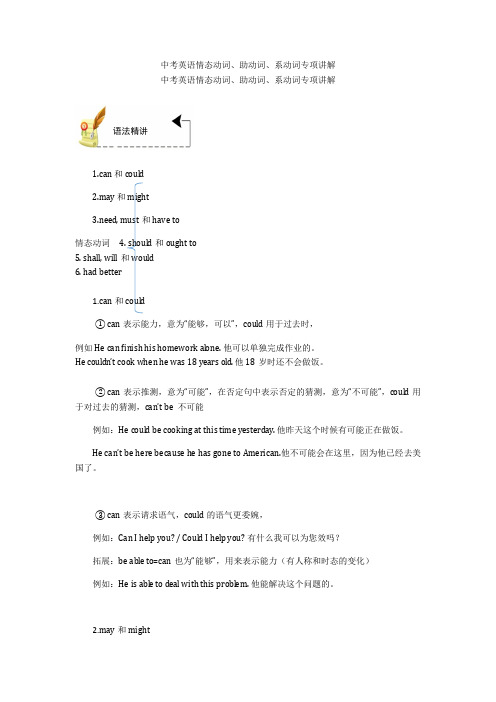
中考英语情态动词、助动词、系动词专项讲解中考英语情态动词、助动词、系动词专项讲解语法精讲1.can 和could2.may 和might3.need, must和have to情态动词 4. should和ought to5. shall, will和would6. had better1.can和coul d① can表示能力,意为“能够,可以”,could用于过去时,例如He can finish his homework al one. 他可以单独完成作业的。
He couldn’t cook when he was 18 years old. 他18岁时还不会做饭。
② can表示推测,意为“可能”,在否定句中表示否定的猜测,意为“不可能”,could用于对过去的猜测,can’t be 不可能例如:He could be cooking at this time yesterday. 他昨天这个时候有可能正在做饭。
He can’t be here be cause he has gone to American.他不可能会在这里,因为他已经去美国了。
③ can表示请求语气,coul d的语气更委婉,例如:Can I help you? / Coul d I help you? 有什么我可以为您效吗?拓展:be abl e to=can也为“能够”,用来表示能力(有人称和时态的变化)例如:He is able to d eal with this problem. 他能解决这个问题的。
2.may和 might① may表示请求,might语气更委婉,例如:May I help you?Might I sit here?② may表示肯定的推测,语气比can更弱,might对过去的推测例如:Mary may be doing her homework now.May can be doing her homework now. can表达的推测语气比may更强,更有把握。
情态动词和助动词——中考专题讲解

助动词和情态动词1、助动词和情态动词的定义:助动词一般没有词义,主要构成谓语,表示时态、语态或构成疑问及否定形式。
情态动词,有词义,但它也和助动词一样,不能单独作谓语,它必须和其他动词一起构成谓语。
情态动词没有人称和数的变化,其后必须跟动词原形。
判断正误:()She cans swim well. ()She can swims well.()She can swim well. ()She swims well.(1)助动词的种类①be(am,is,are,was,were,been,being)助动词be与现在分词结合,可以构成进行时态,与过去分词结合可以构成被动语态。
Eg. I am reading the book.我正在读这本书。
The book was written by me.这本书是我写的。
②have(has,had,having)助动词have与过去分词结合,构成完成时态。
Eg. I have finished my homework.我已经写完作业了。
She has finished her homework.她已经写完作业了。
We had finished our homework.我们已经写完作业了。
③shall(should),will(would)助动词shall和will与动词结合,构成将来时。
Eg. I will visit Beijing tomorrow.我明天将到北京参观。
We shall be very happy to see you.我们见到你会很高兴的。
④do(does,did)助动词do与其他动词结合构成否定句和疑问句。
Eg. I don’t like dogs.我不喜欢狗。
Does she clean the room? 她打扫房间吗?Did you know it? 你不知道吗?(2)情态动词的种类2、can(could),may(might),must(need,have to)基本句型:肯定句:主语+can,may,must+动词原形+……否定句:主语+can,may,must +not+动词原形+……疑问句:Can,May,Must+主语+动词原形+……?(1)can,may,must的肯定句①can的肯定句A.表示能力,许可,可能性。
初中英语2025届中考动词考点分类讲解练习(实义动词+系动词+助动词+情态动词)
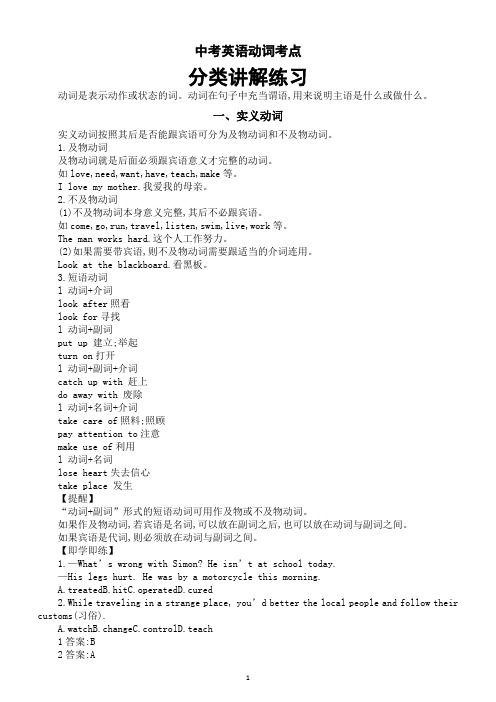
中考英语动词考点分类讲解练习动词是表示动作或状态的词。
动词在句子中充当谓语,用来说明主语是什么或做什么。
一、实义动词实义动词按照其后是否能跟宾语可分为及物动词和不及物动词。
1.及物动词及物动词就是后面必须跟宾语意义才完整的动词。
如love,need,want,have,teach,make等。
I love my mother.我爱我的母亲。
2.不及物动词(1)不及物动词本身意义完整,其后不必跟宾语。
如come,go,run,travel,listen,swim,live,work等。
The man works hard.这个人工作努力。
(2)如果需要带宾语,则不及物动词需要跟适当的介词连用。
Look at the blackboard.看黑板。
3.短语动词l 动词+介词look after照看look for寻找l 动词+副词put up 建立;举起turn on打开l 动词+副词+介词catch up with 赶上do away with 废除l 动词+名词+介词take care of照料;照顾pay attention to注意make use of利用l 动词+名词lose heart失去信心take place 发生【提醒】“动词+副词”形式的短语动词可用作及物或不及物动词。
如果作及物动词,若宾语是名词,可以放在副词之后,也可以放在动词与副词之间。
如果宾语是代词,则必须放在动词与副词之间。
【即学即练】1.—What’s wrong with Simon? He isn’t at school today.—His legs hurt. He was by a motorcycle this morning.A.treatedB.hitC.operatedD.cured2.While traveling in a strange place, you’d better the local people and follow their customs(习俗).A.watchB.changeC.controlD.teach1答案:B2答案:A二、系动词系动词不能单独作谓语,必须与表语一起构成谓语。
中考英语语法复习动词分类
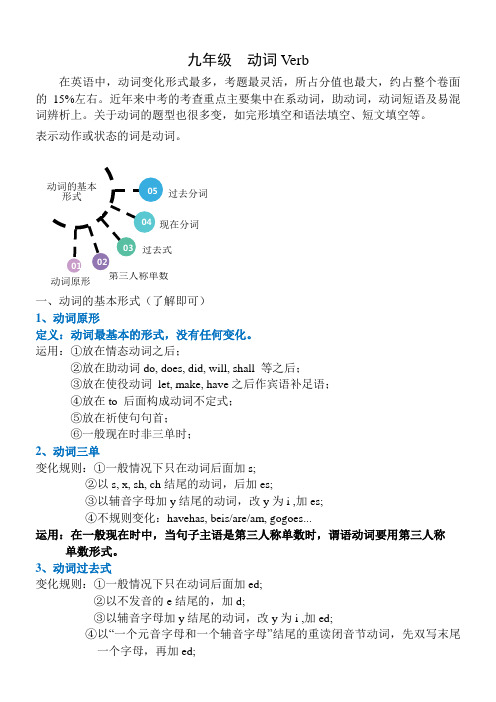
九年级 动词Verb在英语中,动词变化形式最多,考题最灵活,所占分值也最大,约占整个卷面的15%左右。
近年来中考的考查重点主要集中在系动词,助动词,动词短语及易混词辨析上。
关于动词的题型也很多变,如完形填空和语法填空、短文填空等。
表示动作或状态的词是动词。
一、动词的基本形式(了解即可) 1、动词原形定义:动词最基本的形式,没有任何变化。
运用:①放在情态动词之后;②放在助动词do, does, did, will, shall 等之后;③放在使役动词 let, make, have 之后作宾语补足语; ④放在to 后面构成动词不定式; ⑤放在祈使句句首; ⑥一般现在时非三单时; 2、动词三单变化规则:①一般情况下只在动词后面加s;②以s, x, sh, ch 结尾的动词,后加es;③以辅音字母加y 结尾的动词,改y 为i ,加es; ④不规则变化:havehas, beis/are/am, gogoes...运用:在一般现在时中,当句子主语是第三人称单数时,谓语动词要用第三人称单数形式。
3、动词过去式变化规则:①一般情况下只在动词后面加ed;②以不发音的e 结尾的,加d;③以辅音字母加y 结尾的动词,改y 为i ,加ed;④以“一个元音字母和一个辅音字母”结尾的重读闭音节动词,先双写末尾一个字母,再加ed;动词原形过去分词⑤不规则变化:havehad, bewas/were, gowent...运用:在一般过去时中,动词原形要改为过去式4、现在分词变化规则:①一般情况下只在动词后面加ing②以不发音的e结尾的,先去掉e,再加ing;③以“一个元音字母和一个辅音字母”结尾的重读闭音节动词,先双写末尾一个字母,再加ing;④以ie结尾的名词,一般将ie改为y,再加ing. 如lie, tie, die运用:现在分词与be动词构成进行时态,现在进行时或过去进行时。
5、过去分词变化规则:过去分词规则变化与过去式相同,动词不规则变化需查不规则变化动词表。
动词详解3

评了。 A bridge should be built here. 这儿应该建座桥。
现在时
过去时
将来时
语态
主动语态
一般时
完成时
进行时
被动语态
以I clean the house为例
I clean the house.
I cleaned the house yesterday.
一般现在时(第三人称单数加 s)
一般过去时(v-ed,见表格)
I will clean the house
将来完成时(will have done)
过去将来时(would do/ was/were going to do)
过去将来完成时(would have done, “本想做但并 未做” )
以I clean the house为例
I have been cleaning the house for 3 hours.
house at this time
tomorrow.
将来进行时(will be doing)
以I clean the house为例
I have cleaned the house for 3 hours.
I had cleaned the house before I cooked.
I will have cleaned the house by 10 tonight.
tomorrow.
一般将来时(will/be going to
I am cleaning the house. do)
I was cleaning the house at this time yesterday. 现在进行时(be doing)
语法基础详解:动词的分类——实义动词,系动词,助动词与情态动词,太全了!
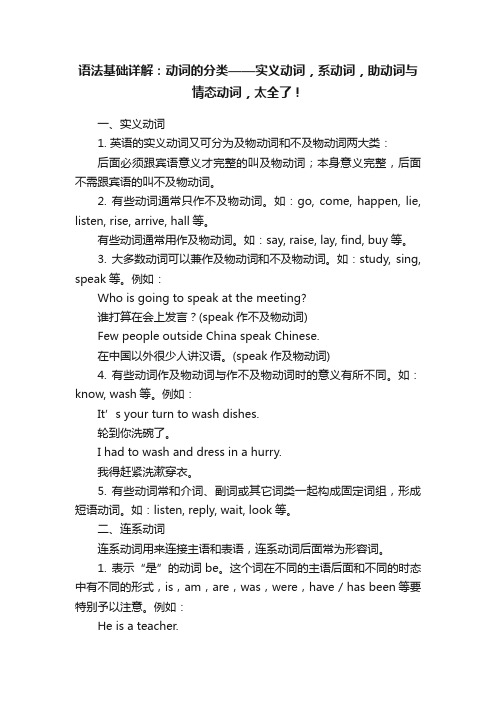
语法基础详解:动词的分类——实义动词,系动词,助动词与情态动词,太全了!一、实义动词1. 英语的实义动词又可分为及物动词和不及物动词两大类:后面必须跟宾语意义才完整的叫及物动词;本身意义完整,后面不需跟宾语的叫不及物动词。
2. 有些动词通常只作不及物动词。
如:go, come, happen, lie, listen, rise, arrive, hall等。
有些动词通常用作及物动词。
如:say, raise, lay, find, buy等。
3. 大多数动词可以兼作及物动词和不及物动词。
如:study, sing, speak等。
例如:Who is going to speak at the meeting?谁打算在会上发言?(speak作不及物动词)Few people outside China speak Chinese.在中国以外很少人讲汉语。
(speak作及物动词)4. 有些动词作及物动词与作不及物动词时的意义有所不同。
如:know, wash等。
例如:It’s your turn to wash dishes.轮到你洗碗了。
I had to wash and dress in a hurry.我得赶紧洗漱穿衣。
5. 有些动词常和介词、副词或其它词类一起构成固定词组,形成短语动词。
如:listen, reply, wait, look等。
二、连系动词连系动词用来连接主语和表语,连系动词后面常为形容词。
1. 表示“是”的动词be。
这个词在不同的主语后面和不同的时态中有不同的形式,is,am,are,was,were,have / has been等要特别予以注意。
例如:He is a teacher.他是个教师。
We are Chinese.我们是中国人。
2. 表示“感觉”的词,如look(看起来),feel(觉得,摸起来),smell(闻起来),sound(听起来),taste(尝起来)等。
英语系统学习词法情态动词、助动词、系动词专项

英语专项学习情态动词、助动词、系动词动词被动语态变化(以do为例)二、实义动词-语态1.主动表示被动①表示主语具备内在品质或性能常见的动词:write, read, clean, sell, wash, cook, open, close, lockThe clothes washes well.The book sells well.②某些日常用语(cook, bake, make, print, pack, build,work out)等动词用于进行时态时,如:The plan is working out.The fish is cooking.1.主动表示被动③表示“需要”的need, want, require 后,表示需要做某事表示“值得”be worth, deserve 后,表示值得做某事,如:The window wants/needs/requires repairing.The book is worth/deserves reading twice④动词不定式的主动形式表示被动含义。
•在“be+形容词+ to do”句型,如:English words are difficult to remember.【注】常用于此句型形容词有easy, hard, difficult, heavy, light, comfortable 等。
•在“be to blame / seek / let”结构中。
如:The house is to let. He is to blame for this. need/want/ require doing = need/want/ require to be done deserve doing =deserve to be done1.Nowadays robots _____ to do more dangerous tasks for human beings.A. are being programmedB. are programmingC. will be programmedD. will program2. ---Will you attend the meeting this afternoon?---But I _____ anything about that.A. hadn’t been toldB. haven’t been toldC. didn’t tellD. won’t tell 3. ---Why are you buying a new refrigerator?---The old one _____ so many times that it’s not worth it any more.A. has repairedB. is repairedC. has been repairedD. has been repairing 小试牛刀1.Your composition _______ beautifully.Is it the one I saw you write yesterday ?A. readsB.readC.is readD.was read2.I want to buy that kind of cloth because I _____ the cloth _____ well.A. have been told; washesB. have told; washedC. was told; washedD. have been told; is washed小试牛刀2.不可变为被动语态的情况①不及物动词没有被动语态。
中考英语情态动词、助动词、系动词专项讲解 (3)

中考英语情态动词、助动词、系动词专项讲解中考英语情态动词、助动词、系动词专项讲解语法精讲1.can 和could2.may 和might3.need, must和have to情态动词 4. should和ought to5. shall, will和would6. had better1.can和coul d① can表示能力,意为“能够,可以”,could用于过去时,例如He can finish his homework al one. 他可以单独完成作业的。
He couldn’t cook when he was 18 years old. 他18岁时还不会做饭。
② can表示推测,意为“可能”,在否定句中表示否定的猜测,意为“不可能”,could用于对过去的猜测,can’t be 不可能例如:He could be cooking at this time yesterday. 他昨天这个时候有可能正在做饭。
He can’t be here be cause he has gone to American.他不可能会在这里,因为他已经去美国了。
③ can表示请求语气,coul d的语气更委婉,例如:Can I help you? / Coul d I help you? 有什么我可以为您效吗?拓展:be abl e to=can也为“能够”,用来表示能力(有人称和时态的变化)例如:He is able to d eal with this problem. 他能解决这个问题的。
2.may和 might① may表示请求,might语气更委婉,例如:May I help you?Might I sit here?② may表示肯定的推测,语气比can更弱,might对过去的推测例如:Mary may be doing her homework now.May can be doing her homework now. can表达的推测语气比may更强,更有把握。
中考英语语法专题详解七:情态动词、系动词

中考英语语法专题详解七:情态动词、系动词在英语中,表示主语动作或状态的词就叫做动词。
根据动词的意义及在句子中的作用,可将动词分为实义动词(v)、系动词(link-v)、情态动词(modal verb)和助动词(v. aux)四种类型。
下面就跟小编一起就来看看情态动词和系动词的具体用法。
专题七情态动词、系动词一、情态动词情态动词本身有一定的意义,但不能独立作谓语,要和动词原形一起构成谓语,表说话人的语气和态度。
它没有人称和数的变化。
常见的情态动词有:1. can表示能力,有“能”“会”的意思;表示可能性,多用在否定或疑问句中;表示请求和许可。
如:The parrot can speak three languages. 这只鹦鹉能讲三种语言。
Can I borrow the book from the library?我可以从图书棺借这本书吗?Shanghai can be very cold in March. 上海三月份可能会很冷。
拓展延伸can还有过去式could 可表“能,会”,又可以和be able to替换,而be able to有更多时态。
如:He could swim when he was four. =He was able to swim when he was four. 他四岁时就会游泳。
在一般疑问句中,can/could 常用来表示请求或征求对方意见,用could 比用can语气更加委婉和客气。
类似用法的还有Will /Would you (please)…等句型。
如:Could you tell me how I can get to the post office? 你能告诉我怎样到邮局吗? Would you please turn up the radio?请你把收音机开大点,好吗?2.may表示“许可”时,相当于can,其否定回答用can’t/mustn’t;表推测时,常用在肯定句中,表“可能”。
中考英语 专题七 动词的分类、时态、语态、非谓语动词、情态动词

第一讲动词的分类动词是表示动作或状态的词。
句子中的谓语成分是由动词充当的,谓语通常是句中不可缺少的成分,因此动词是英语词类中最重要的一种。
动词可以通过本身的变化来表示动作发生的时间以及说话人的语气、态度等。
1.动词的种类动词按其词义和在句中的作用可以分为:行为动词(或称实义动词)、连系动词、助动词和情态动词。
1)行为动词又可分为及物动词(vt.)和不及物动词(vi.)两种。
及物动词作谓语,后面必须跟宾语意思才完整。
不及物动词作谓语,后面不能跟宾语,只有加上介词后才可接宾语。
2)英语中有些动词常常是既作及物动词又作不及物动词;既作连系动词工作及物动词。
例如:He speaks English very well. (vt.)He spoke at the meeting. (vi.)另外,动词按其在句中能否作谓语,又可分为谓语动词(finite verb)和非谓语动词(non-finite verb)两大类。
说明:谓语动词又称限定动词,非谓语动词又称非限定动词。
非谓语动词初中阶段主要学习动词不定式的用法。
2.动词的基本形式英语动词有五种基本形式,即动词原形、过去式、过去分词、现在分词和第三人称单数形式。
如:work—worked—worked—working—works。
它们的构成及说明:1)词尾-ed在清辅音后读[t];在浊辅音和元音后读[d];在[t]和[d]后读[id]。
2)词尾-es或-s在[s ]、[z]、[t ]、[d ]后面读[iz];在清辅音后读[s];在浊辅音及元音后读[z];在[t],[d]后读[ts]、[dz]。
3)不规则动词的过去式与过去分词则要根据不规则动词表逐渐记住。
第二讲动词的时态1.一般现在时1)构成动词一般现在时,除主语为单数第三人称以外,谓语动词一律用原形,若主语为第三人称单数,则谓语动词的词尾应发生变化(加-s或-es)。
另外be和have 有特殊的人称变化形式。
英语情态动词、助动词、系动词专项讲解
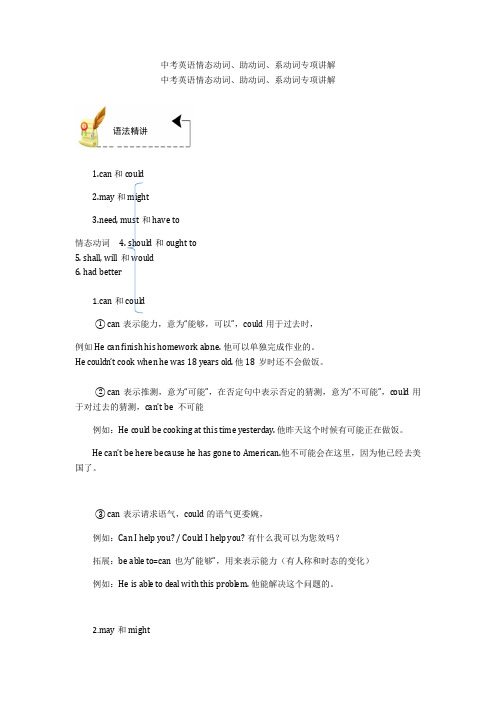
中考英语情态动词、助动词、系动词专项讲解中考英语情态动词、助动词、系动词专项讲解语法精讲1.can 和could2.may 和might3.need, must和have to情态动词 4. should和ought to5. shall, will和would6. had better1.can和coul d① can表示能力,意为“能够,可以”,could用于过去时,例如He can finish his homework al one. 他可以单独完成作业的。
He couldn’t cook when he was 18 years old. 他18岁时还不会做饭。
② can表示推测,意为“可能”,在否定句中表示否定的猜测,意为“不可能”,could用于对过去的猜测,can’t be 不可能例如:He could be cooking at this time yesterday. 他昨天这个时候有可能正在做饭。
He can’t be here be cause he has gone to American.他不可能会在这里,因为他已经去美国了。
③ can表示请求语气,coul d的语气更委婉,例如:Can I help you? / Coul d I help you? 有什么我可以为您效吗?拓展:be abl e to=can也为“能够”,用来表示能力(有人称和时态的变化)例如:He is able to d eal with this problem. 他能解决这个问题的。
2.may和 might① may表示请求,might语气更委婉,例如:May I help you?Might I sit here?② may表示肯定的推测,语气比can更弱,might对过去的推测例如:Mary may be doing her homework now.May can be doing her homework now. can表达的推测语气比may更强,更有把握。
中考英语动词分类及动词短语
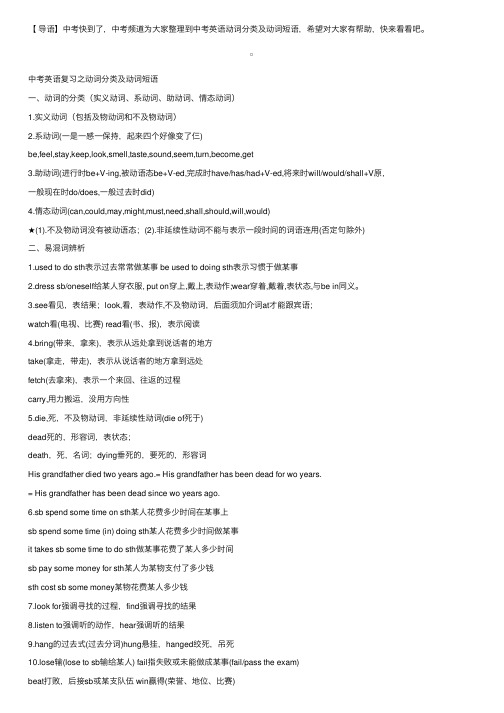
【导语】中考快到了,中考频道为⼤家整理到中考英语动词分类及动词短语,希望对⼤家有帮助,快来看看吧。
中考英语复习之动词分类及动词短语⼀、动词的分类(实义动词、系动词、助动词、情态动词)1.实义动词(包括及物动词和不及物动词)2.系动词(⼀是⼀感⼀保持,起来四个好像变了仨)be,feel,stay,keep,look,smell,taste,sound,seem,turn,become,get3.助动词(进⾏时be+V-ing,被动语态be+V-ed,完成时have/has/had+V-ed,将来时will/would/shall+V原,⼀般现在时do/does,⼀般过去时did)4.情态动词(can,could,may,might,must,need,shall,should,will,would)★(1).不及物动词没有被动语态;(2).⾮延续性动词不能与表⽰⼀段时间的词语连⽤(否定句除外)⼆、易混词辨析ed to do sth表⽰过去常常做某事 be used to doing sth表⽰习惯于做某事2.dress sb/oneself给某⼈穿⾐服, put on穿上,戴上,表动作;wear穿着,戴着,表状态,与be in同义。
3.see看见,表结果;look,看,表动作,不及物动词,后⾯须加介词at才能跟宾语;watch看(电视、⽐赛) read看(书、报),表⽰阅读4.bring(带来,拿来),表⽰从远处拿到说话者的地⽅take(拿⾛,带⾛),表⽰从说话者的地⽅拿到远处fetch(去拿来),表⽰⼀个来回、往返的过程carry,⽤⼒搬运,没⽤⽅向性5.die,死,不及物动词,⾮延续性动词(die of死于)dead死的,形容词,表状态;death,死,名词;dying垂死的,要死的,形容词His grandfather died two years ago.= His grandfather has been dead for wo years.= His grandfather has been dead since wo years ago.6.sb spend some time on sth某⼈花费多少时间在某事上sb spend some time (in) doing sth某⼈花费多少时间做某事it takes sb some time to do sth做某事花费了某⼈多少时间sb pay some money for sth某⼈为某物⽀付了多少钱sth cost sb some money某物花费某⼈多少钱7.look for强调寻找的过程,find强调寻找的结果8.listen to强调听的动作,hear强调听的结果9.hang的过去式(过去分词)hung悬挂,hanged绞死,吊死10.lose输(lose to sb输给某⼈) fail指失败或未能做成某事(fail/pass the exam)beat打败,后接sb或某⽀队伍 win赢得(荣誉、地位、⽐赛)11.lose丢失,失去;forget忘记(forget to do sth 忘记去做某事,forget doing sth 忘记做过某事)leave sth +地点(吧某物落在某地)12.think of想到,认为;think about考虑;think over仔细考虑,反复思考13.may be(可能是)为情态动词加原形表⽰推测,在句中做谓语;maybe (⼤概,也许)为副词,相当于perhaps,⽤于句⾸My father may be at home now.= Maybe my father is at home now.三、常见的动词短语1.look for寻找, look after照顾, look forward to doing sth渴望做某事, look at看着,look up抬头看,查找,look like看起来像,look through浏览,look out当⼼2.put off推迟,put on穿上,上演,put away把…收起来,put up举起,建造,张贴,put out扑灭,put down写下,放下3. turn down把⾳量开⼩⼀点;拒绝;turn up把⾳量开⼤⼀点;出现,turn over翻开;翻转,,turn on 打开(电灯等) turn off 关(电灯等)4.be friendly/kind to对…友好,be different from与…不同,be afraid of害怕,be popular with受…欢迎,be interested in对…感兴趣,be surprised at对…惊讶,be proud of(take pride in)对…感到⾃豪,be strict with sb对某⼈严格,be strict in sth 对某事严格, be good at擅长,be sure of/about对…有把握,be made up of由…构成,be angry with sb对某⼈⽣⽓;be busy with sth忙于;be full of/filled with装满了,be late for…迟到,be covered with覆盖着be famous/known for因…;be famous/known as作为…有名5.get on/along (well) with与某⼈相处(融洽),在…进展(顺利),get up起床,get on上车(船、飞机),get off下车get home到家,get out (of) (从…)出去,get to到达get together聚会,get over克服,get used to习惯于6.take off(飞机)起飞,脱掉(⾐服),take away拿⾛;take out取出,take up占据时间、空间,开始从事,拿起,take photos 照相,take one's place= take the place of sb坐某⼈的座位;代替某⼈的职务 take a seat就坐take a shower淋浴,洗澡take care of照顾 take care⼩⼼,当⼼take one’s temperature量体温 take part in参与,参加 take it easy别着急,慢慢来7.agree with sb同意某⼈agree to do sth同意做某事8.pick up拾起,捡起,拿起,收听,⽤车接送客⼈、货物,收拾、整理;pick out挑选。
四类动词(实义动词、系动词、助动词、情态动词)的用法讲解-高考英语语法总复习

四类动词(实义动词、系动词、助动词、情态动词)的用法讲义2022届高考英语语法总复习实义动词的用法实义动词的概念实义动词是表示动作或状态,有完整意义,能在句中独立作谓语的动词They eat a lot of potatoes.他们吃了大量土豆。
根据词尾是否接宾语实义动词可分为及物动词(vt.)和不及物动词( vi. )及物动词及物动词是指后面带有宾语的动词,其后要接宾语,意义才完整宾语通常由名词、代词、动词-mg形式、动词不定式等构成He always does his homework at home.他总是在家里做作业。
I have lunch at school every day.我每天在学校吃午饭。
用法:1、及物动词可用于被动语态中The work has been finished for two hours.这项工作已经完成两个小时了。
The cup was broken by my brother.茶杯被我弟弟打破了。
2、及物动词可以有直接宾语、间接宾语或复合宾语He passed me the ball.他把球传给我了。
Keep the classroom clean and tidy.保持室内干净、整洁。
注意:常见的能带双宾语的动词有:bring, buy, cook, draw, find, get, hand, leave, end make, offer. pass, pay, read, return, sell, show, each, tell write, etc.不及物动词不及物动词本身意思完整,其后无需跟宾语实例:He spoke at the meeting.他在会上发了言。
Don't look for an excuse.别找借口了。
注意:很多动词既可用作及物动词又可作不及物动词如何区别它们,就看它们后面是否直接接名词作宾语He studies English very hard.他非常努力地学习英语。
- 1、下载文档前请自行甄别文档内容的完整性,平台不提供额外的编辑、内容补充、找答案等附加服务。
- 2、"仅部分预览"的文档,不可在线预览部分如存在完整性等问题,可反馈申请退款(可完整预览的文档不适用该条件!)。
- 3、如文档侵犯您的权益,请联系客服反馈,我们会尽快为您处理(人工客服工作时间:9:00-18:30)。
例如:Must I finish my homework now?
Yes, you must. / No, you needn’t.
④must和have to的区别:
a) must没有人称、时态的变化,而have to根据人称、时态的变化,有不同的形式。
例如:Can I help you? / Could I help you?有什么我可以为您效吗?
拓展:be able to=can也为“能够”,用来表示能力(有人称和时态的变化)
例如:He is able to deal with this problem.他能解决这个问题的。
2.may和might
I单项选择。
1.Students _____ wear uniforms at school.
A.must B. can C. may D. need
2.We _____ talk or speak loudly in public places like hospitals, libraries or cinemas?
A. Must; needn’t; may B. Must; mustn’t; can.
C. Shall; can’t; must D. Need; mustn’t; may9.–Do you think his story ______ true?--I don’ think so. But it sounds good.
We are in Grade six this year.
二、分类
连系动词可具体分为三类:
1、表示“是”的动词be。这个词在不同的主语后面和不同的时态中有不同的形式,is,am,are,was,were,have/has been等要特别予以注意。
例如: He is a teacher. He was a soldier two years ago.
b) Must表示主观上必须做,而have to表示客观需要。
例如: I must go now.我必须走了。(我想走了)
I have to go now.我不得不走了。(因为太晚了等原因,不得不走)
◆Need的用法:
Need既可以作“情态动词”,又可以作“实义动词”。
Need作“情态动词”的用法:肯定:need否定:needn’t.
Yes, you must. / No, you needn’t.
Need作“实义动词”的用法:
a)Need作“实义动词”时,可接名词或动词不定式。
肯定:need+名词need+to do否定:don’t need to do
例如: I need some water, I am very thirsty.
3. must和have to
must表示命令、责任,意为“一定,必须”,must not/ mustn’t表禁止,“一定不要”,
例如:Children must stay away from strangers.孩子一定要远离陌生人。
You mustn’t play fire because it’s dangerous.千万不要玩火,因为太危险了。
3.should, ought to
should表示义务,意为“应该”。否定:shouldn’t表示“不应该”。
ought to表示义务,意为“应该”,语气更强。否定:ought not to表示“不应该”.
例如:We should protect our environment.我们应该保护我们的环境。
We ought to protect our environment.我们应该保护我们的环境。
4.shall, will和would
shall表请求、建议,
例如:Shall we go shopping together?
will表请求、意愿,would表对过去的意愿或者比will语气更委婉的请求
1、look看;看起来
He is looking at the picture.(他正在看这图片。)行为动词
It looks beautiful.(它看上去很美丽。)连系动词
2、feel摸;感觉
I feel someone touch my arm. (我感到有人碰我的手臂。)行为动词
I am not feeling well. (我今天感觉不太好。)连系动词
2、表示“感觉”的词,即感官动词,如look(看起来),feel(觉得,摸起来),smell(闻起来),sound(听起来),taste(尝起来)等感官动词后面加形容词。
3、表示“变”、“变成”的意思的词,如come,become, get, grow, turn, go都解释为“变”、“变得”
例如:
例如:I don’t need to get up early.
Parents need love their children more.
had better否定形式在better后加not,had通常可以和主语缩写。
例如:You'd better not make a mistake again.
3、smell嗅;闻起来
My little brother likes to smell the apple before he eats it.
a) need作“情态动词”时,多用于否定句和疑问句中,一般不用于肯定句。
例如: You needn’t worry about us.
Need I water these flowers now?
b)作一般疑问句开头提问时:肯定用must回答,否定用needn’t回答。
例如: Need I clean the room?
—It______ be John' s. It ‘s ______ small for him.
A. can't; much too B, can't; too much C. mustn't; much too D. mustn't; too much
. 7. -- May I go out now, Dad?
She becomes a college student.
His face turns white.
The weather gets warmer and the days get longer when spring comes.
三、难点解释
注意区别以下一些动词的用法,它们既可以作为行为动词,又可以作为连系动词。
A.can B. may C. must D. could
5.t the next stop.
A.must B. had to C. have to D. would have to
6.—Whose T - shirt is this?
例如He can finish his homework alone.他可以单独完成作业的。
He couldn’t cook when he was 18 years old.他18岁时还不会做饭。
can表示推测,意为“可能”,在否定句中表示否定的猜测,意为“不可能”,could用于对过去的猜测,can’t be不可能
◆注意:
情态动词没有单复数形式变化,除了have to
例如:They have to face their problems.
情态动词变为否定句直接在其后加not,回答时用相应的情态动词帮助回答,
例如:Can I help you?
Yes, of course. / I can. No, I can’t. (注意要用缩写形式回答,但may和might除外)
例如:We don’t have to go there.
The boy didn’t have to go to school because there were no people there yesterday.
need作为实义动词,其否定形式和疑问句要用助动词do、does或did来帮助提问,
I can’t / cannot/ can not help you.
但是must的一般疑问句的否定回答例外,
例如:Must I finish my homework?
Yes, you must. No, you needn’t./ don’t have to.
have to的否定形式用do/does/did来完成。
中考英语情态动词、助动词、系动词专项讲解
中考英语情态动词、助动词、系动词专项讲解
1.can和could
2.may和might
3.need, must和have to
情态动词4. should和ought to
5. shall, will和would
6. had better
1.can和could
can表示能力,意为“能够,可以”,could用于过去时,
A.needn’t B. mustn’t C. may not D. don’t
3.____ you tell me how to improve my memory?
A.Do B. Can C. Must D. Should
4.I _____ neither read nor write at that time.
may表示请求,might语气更委婉,
例如:May I help you?
Might I sit here?
may表示肯定的推测,语气比can更弱,might对过去的推测
例如:Mary may be doing her homework now.
